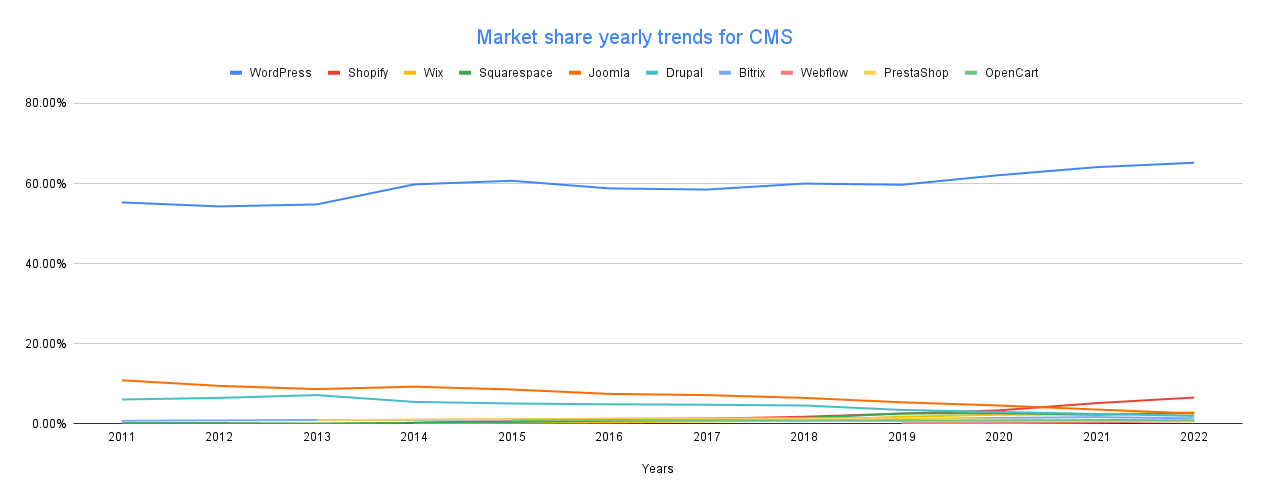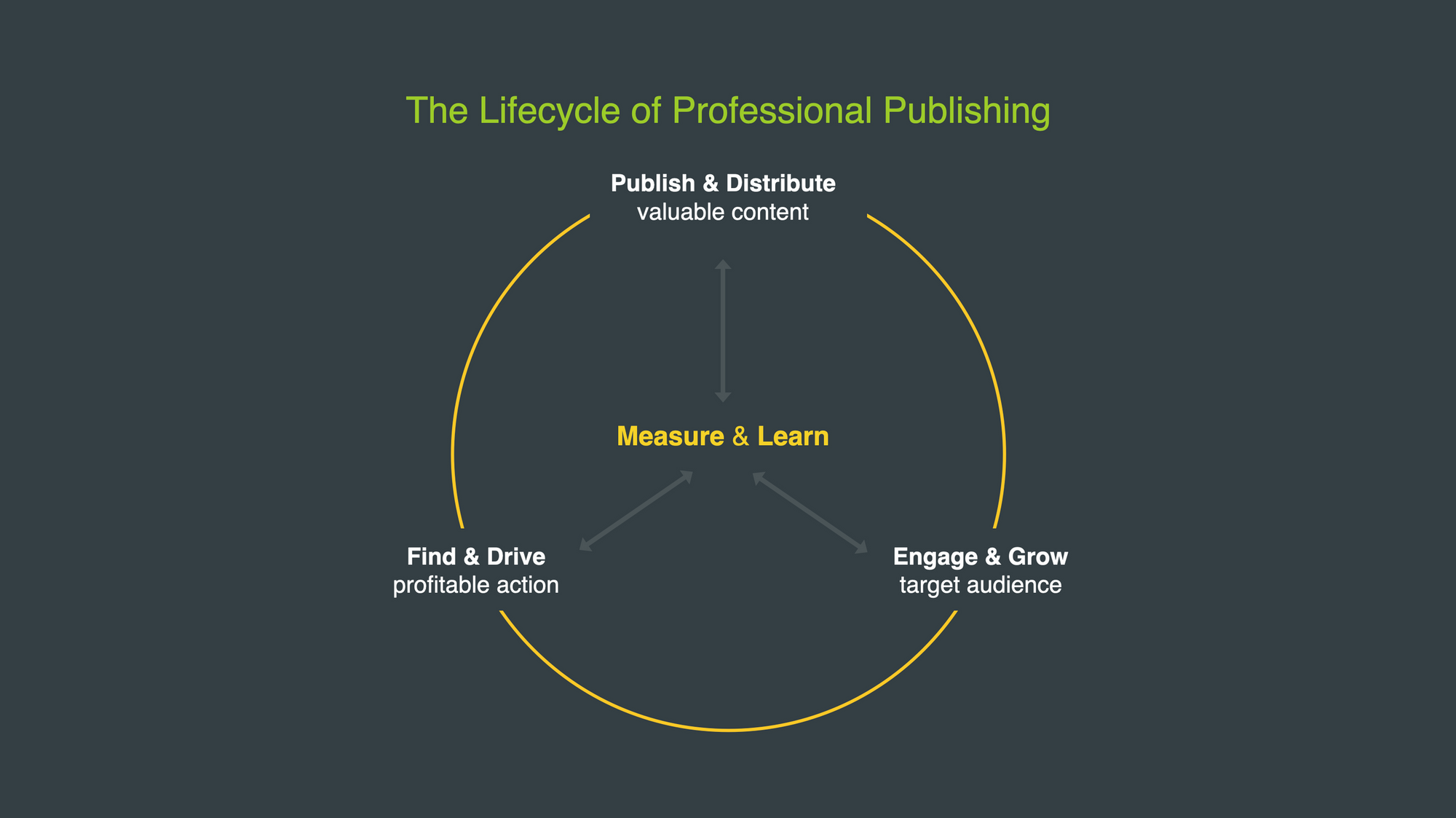Today's dilemma on finding the perfect CMS

I tried multiple times to switch from WordPress to another CMS for Merci Larry and failed as many times. I still didn’t find my CMS fit; the one that will give me the same ability and features as in WordPress.
WordPress market-share is still way ahead
Despite the rise of recent CMS, WordPress still has the biggest market-share. Yet, it’s an old technology and the framework itself is heavy. Some themes and plugins come on top of that; making lots of developers reluctant to use such a framework. While you can’t do much without some plugins (I’m thinking about Yoast for instance (ndlr; I truly believe that this SEO side should be native)), it adds complexity and sometimes heaviness to an already heavy framework.

The rise of brand new CMS
According to W3Techs, the fastest growing CMS since April 2022 are
- Elementor
- Webflow
- Wix
With the release of Gutenberg and now WordPress 6 Arturo, I’m doubtful Elementor will continue to acquire new users. I’ve never used it but from what I understood, Elementor is built on top of WordPress and gives you the ability to drag and drop blocks. So basically, now what offers WordPress natively.
Webflow is ultra attractive thanks to its design and possibilities it offers. The promise of no-code may seem cool in the first hand because you can build your page fast without having to worry about the code. On the other hand, that’s what scares me. How is the code generated according to your design? This is where I draw a strict line between design and performance. I would rather go with an old fashion website than a beautiful website with the worst performances ever. I haven’t heard good things about this CMS, especially about the implementation of the tagging plan and… well, SEO options.
I’m used to laugh at people who tell me stories about websites built with Wix. And I think I’m not the only one in our industry. Still, Wix seems to have added new features to overcome its weaknesses.
There are also a lot of less known but yet very interesting CMS. Charly Wargnier brought up a nice thread when asking for the best CMS blogging platform. From small ones to big names, lots of CMS have been mentioned.
Best CMS for blogging in 2022?
— DataChazGPT 🤯 (not a bot) (@DataChaz) May 14, 2022
Still @WordPress? Or are there some worthy new alternatives?
What are their value proposition?
Today, there are so much CMS out there that it’s difficult to know which one is going to convince you at first sight.
- The platform commerce is built on (Shopify)
- Create a website you’re proud of (Wix)
- Everything to sell anything (Squarespace)
- The Flexible Platform Empowering Website Creators (Joomla)
- The site you want — without the dev time (Webflow)
- Unlock the full potential of your ecommerce (Prestashop)
- The best Free and open-source eCommerce platform (OpenCart)
- Create Websites, Design Your Future (Elementor)
Value propositions focus on ecommerce and no-code. Now, let’s do the same exercise for blogging CMS (some of the ones mentioned in Charly’s thread).
- Turn your audience into a business (Ghost)
- When content meets code, magic happens (Motif)
- Transform your plain text into static websites and blogs (Jekyll)
- Headless CMS that commits (Forestry)
- Build beautiful, easy to manage websites (Statamic)
- The world’s fastest framework for building websites (Hugo)
To my surprise, only Hugo highlights speed. The other ones highlight monetization, design and easiness.
Ghost
I gave the free trial a go a few months ago while thinking about switching from WordPress to Ghost. At first, it may seems odd but I was appealed by their homepage as well as John’s website (called Rediverge), the CEO and co-founder of Ghost. I also liked the way Ghost highlights their carbon neutral position, being open source and a non-profit foundation. We all have our environmental part and this is something I want to take care of; Merci Larry’s carbon footprint.
Creating the account for the free trial is really easy and it gives you a first sight of the CMS experience. One you’re in there, it’s very simple and easy to use. I really liked the dashboard: you have access to all the data related to their promise and headline: turning your audience into a business. So basically you can see the number of subscribers, paid subscribers, evolution of MRR and so on. To me, this is an extra value when comparing to WordPress where the dashboard is not useful at all.
Migrating your pages and posts from WordPress to Ghost is really easy as well. I don’t have a lot of posts and pages so maybe it’s more difficult when your database is heavier.
Then, I struggled writing new articles. The experience is only focused on giving you all the comfort you may need to write but it lacked options to me. Same for pages. I wasn’t able to customize my pages or content as I wanted to.
I tested all the free templates available but was disappointed seeing that I couldn’t have the ball in my court. I’m sure you can customize as you want when you select the Creator plan or higher but I think you need to code. This is definitely not something I wanted to go into as I wanted to focus on writing and customizing as I used to on WordPress without having to code. Somewhere, I abandoned my idea and got back to WordPress.
Ghost 5.0 released on May 23rd, 2022
By the time I published this article, I didn’t know Ghost 5.0 has been released. I enjoyed reading their changelog, especially the long version. They explained how they used feedbacks from different websites to improve Ghost. To my opinion, the above highlighted the lack of edge cases covered by Ghost. Now, it seems en route.

Version 5 comes with a new official theme which is good because it offers more various designs as you can’t customize it unless you’re a developer. It also comes with a direct integration of Grammarly. I don’t use it (I guess I should) but it’s very nice as a feature because I see lots of people using the Grammarly extension on Chrome.
Shopify
I had (and still do) the opportunity to give Shopify a go for Poster Collective, our current MVP. JC, Pictarine’s Growth Engineer, didn’t like their own language: Liquid. The fact that you need to adapt to a specific language (Liquid is open source, written in Ruby. Ruby is used by 5.9% of websites so it stays very specific) is not appealing at all; you need to consider a (yet small) learning curve.
We wanted to test Shopify because more and more online businesses are using it and kick ass at it. We currently struggle with a high abandonment rate between add to cart and purchase: by using Shopify, we wanted to compare the funnel. As lots of websites use Shopify and their official templates, we were confident for our AB test. Thing is, it turned out that you can’t do that much without getting the credit card out. For example, you need to pay in order to customize the checkout page.
For that reason and exogenous reasons as well, I explored 1% of what Shopify has to offer. Again, there’s a learning curve that comes with it when you first try it. Obviously, this is normal. Somewhere, it seems antinomic compared to our jobs in which we want to proceed quickly. We end up going quickly by neglecting the learning curve so we use badly or not completely some features, we progress in downgraded mode not to lose time on the essential: the objective which pushes us to use such CMS
Why do we want to stop using WordPress?
It depends ( 🙂 ) on your role.
- If you are a web developer, you want to work with recent languages as PHP has the reputation to be outdated. Ben Hohner answered a question on Quora about “Why is PHP considered an outdated language?“: for curious and non experts, it is super interesting to read!
- If you are a content writer, maybe you want to reduce the complexity of all the options you don’t use. You want to focus on what you do: writing content. You need something that is easy to use and fast to publish.
- If you are an SEO, then you want to grow the audience. In order to do this, you probably want to reduce all the unnecessary complexity brought up by years of development; creating dependencies where it should not. So you want to work on a clean sheet rather than on an old one; with developers as bored as you regarding the heaviness behind each action.
- If you are a Data Analyst in charge of the tagging plan, then you need to easily setup your events and prevent them from being silent for obscure reasons.
Obviously, I forgot to mention other roles but in the end, we all want the same thing: something new, something fast, something easy to use, something easy to customize, something easy to maintain. For some of us, we also want to reduce our website’s carbon footprint.
We also want to learn new CMS. Simply put, we don’t want to stay on the sidelines when new languages and CMS are emerging.
Why is the shift from WordPress so hard?
Look again at the headlines above. Headlines target a specific need.
As long time WordPress users, we first compare the new to the old. So what we know to what we just unboxed. The migration can be though then because new CMS comes with new logics and usages. They tend to develop around specific topics, ecommerce mostly, except for Wix and Elementor for whom the audience is broader. It directly questions our own use cases as features are more limited than in WordPress; maybe for the better actually. More than 55K plugins are available on WordPress and I can’t imagine the number of themes available out there.

So we’ve been used to an abundance of features that we expect to see everywhere else.
Questioning our current usage
Seriously i mean to better ways of using WordPress. I'm learning this
— Aymen Loukil (@LoukilAymen) May 20, 2022
It doesn’t take the old technology out but it questions our use of WordPress. The less plugins, the better? It could be that simple. The thing is: there are tons of plugins and complex themes out there. Anyone can publish a new theme or a new plugin. I don’t know for sure but I don’t think that new publications go through a quality process. And this is certainly why you can easily make a bad use of WordPress, using multi-themes and unnecessary plugins.
Ghost for instance is really focusing on blogging. So you can’t do whatever you want with pages in terms of customisation. I wouldn’t be able to have a black background homepage and white background posts as here for example. It can be frustrating but it has a big benefit: by not giving me control over everything, Ghost keeps control of what I do (I mean in a good way). So I can’t add plugins to add this and that on my posts; I can only use the native features. And that’s for the better. That way, I don’t break the essence of the CMS: blogging.
Release of WordPress 6 on May 24, 2022
Well, I didn’t see that either when publishing this article on May 25th 🙂 Among many other features, this release focus on performance improvements (especially on the reduction of requests execution time and caching). It seems promising. To enjoy this new version at its best, we need to use the latest official theme (or latest compatible themes I think). I tried the new theme, Twenty twenty two and got lost in less than 10 seconds! Even WordPress embarks new ways to manage your website and edit your content. There’s a learning curve here too. In the end, it seems that both technical and content / design needs are drawing a new landscape in the use of CMS and that regardless of the CMS used, old or new, we have a new learning curve to follow.
So, what’s the dilemma?
Wanting to switch from WordPress to a new CMS is, without knowing it, questioning our current usage. It’s choosing a CMS, most often with a monthly or annual subscription, which will not offer the full range of features we are used to. Can we do better with a newer CMS that embeds a more modern language and a lighter framework? Can we question our current usage of WordPress and be ready to break things to start from scratch? That’s the dilemma. We should weigh these questions to know where to draw the line between our needs and the options we got.
Merci Larry WordPress setup
In case you’re wondering, here’s the setup I use for running Merci Larry:
Twenty Twenty official template
I spent so many hours looking for the perfect template over the years that I ended up being bored. So instead of losing time and money (I bought two templates since 2018 for a total cost of $150), I chose the official theme.
Twentig
Twentig comes on top on the above template and basically offers no-code theme customisation. Now that Twenty twenty two is available, I doubt Twentig is still relevant as its main features are now native.
Google Tag Manager for WordPress
It is developed by Thomas Geiger. By using it, I know I don’t lost my container when I update my WordPress.
Mailpoet
I use MailPoet 3 (New, so the latest published plugin). I use the free version so I can let my subscribers know when a new post is published. Actually, I wanted to switch to Ghost but couldn’t make my mind about the pricing as I don’t want to monetize Merci Larry. I tried the 14-days trial of Ghost and I have been amazed by its straight to the point architecture. I was ready to switch but realised that I didn’t even know if people would like to subscribe to the new post notification. So instead of switching, I looked for the same functionality on WordPress and found Mailpoet. It’s basically the same and in the end, for the very few number of subscribers I have, it’s more than sufficient.
Yoast SEO
Do I need to talk about it? I use it mainly because I used it for years.
I also use OVH Cloud for hosting.
It’s a lot for me and I would love the ability to have less plugins. I could easily get rid off Twentig by using the latest official WordPress theme. I also could uninstall Mail Poet; I’ve never promoted the newsletter (actually, you receive an email when a new post is published with the full excerpt directly in the email) and reached 16 subscribers so far =) I also use a plugin for GTM because it took me some time to see that I wasn’t tracking visits once I updated the theme and had to update the <head> section… oops! And then, Yoast. Why do we need a plugin when it should comes natively?